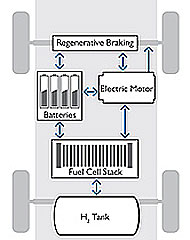A fuel cell combines hydrogen fuel and oxygen to produce electricity used to power an electric motor that moves the vehicle. The only exhaust is water. A number of fuel cell powered electric vehicles are on the roads worldwide, including passenger cars, delivery trucks, buses and military vehicles. Researchers are working to bring down fuel cell and related component costs and to improve durability to enable full commercialization. California boasts the largest number of fuel cell fleets, and there are demonstration projects nationwide, including Washington, DC.

Advantages of fuel cell electric vehicles:
- Zero tailpipe emissions (no CO2 or other pollutants)
- Higher energy efficiency than the internal combustion engine
- Regenerative braking captures and reuses braking energy
- Potential of near-zero well-to-wheel emissions when using renewable fuels to produce hydrogen
- Energy security: no dependence on petroleum
- Grid connection potential providing energy "on call" to the grid
Challenges:
- Cost reduction
- Increased realiability and durability
- Hydrogen generation, distribution, dispensing and onboard storage
- Availability and affordability of hydrogen refueling
- Codes and standards development
- Scalability for mass manufacture
- Consumer education




